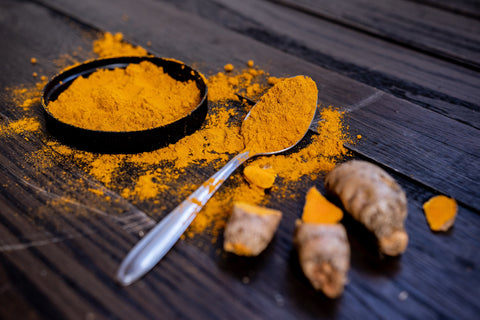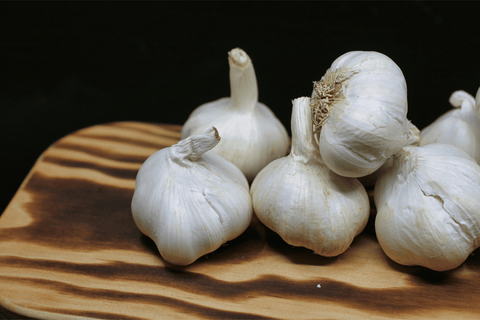Co-Written by: Stacey Simon and Katie Gould
You may be familiar with the anti-inflammatory diet, where the foods we consume play a role in reducing chronic inflammation in our bodies, but may be curious about which foods and nutrients, in particular, can help fight inflammation. Here, we’ll dive into some top nutrients that may help us in reducing inflammation in our bodies.
What is Inflammation?
Inflammation can be broken down into two types: acute and chronic. Acute inflammation is a short-term beneficial inflammatory response to harm, including cuts, scrapes, bee stings, or infection. Chronic, longstanding inflammation isn’t triggered by an acute injury or short-term harm, and can be detrimental to our health. Chronic inflammation is associated with many chronic disease states, including diabetes, heart disease, Alzheimer’s disease, some types of cancer, and arthritis, among others.
Top Nutrients that Help Fight Inflammation
Curcumin:
You may have curcumin in your spice cabinet without even realizing it! Curcumin is the vibrant yellow compound found in the spice turmeric, which is often found in Indian cuisine, mustard, and even in teas. Curcumin is a powerful antioxidant that helps to neutralize free radicals, thus, reducing damage to the cells that make up our bodies. The exact nature of how curcumin reduces inflammation is not fully understood, but it is considered to be one of the most anti-inflammatory compounds out there!

Turmeric:
Turmeric is a versatile spice, and lends a beautiful yellow hue to the foods and beverages it is added to. Try adding turmeric to your rice dishes, poultry marinades, or enjoy a warm cup of turmeric ginger tea. When cooking with turmeric, adding a pinch of black pepper can help to make the curcumin more absorbable in our bodies, so consider adding some black pepper to your next recipe, as well.

Ginger:
You may have enjoyed ginger in teas, cookies, or even crystalized form for an upset stomach, but did you know that ginger may be a powerful anti-inflammatory nutrient? Not only is ginger delicious, it has been shown in many studies to play a role in reducing chronic inflammation and chronic disease. Ginger is rich in antioxidant compounds which may help to reduce inflammation in our bodies and help to reduce the symptoms of inflammatory conditions; more studies are needed to draw direct conclusions.
You can purchase ginger in a powder spice form or in its natural root form; both of which are great ways to incorporate more ginger into your diet. You can freeze ginger root to prolong its shelf life. Try ginger turmeric tea, add some ginger into your morning bowl of oatmeal, or enjoy pickled ginger with your sushi to reap its anti-inflammatory benefits.

Garlic:
Aside from being delicious, garlic boasts an added benefit: being anti-inflammatory! Garlic may help to reduce oxidative stress in our bodies through its antioxidant properties, and is rich in anti-inflammatory organosulfur compounds that may help to keep us healthy. One study showed that light to moderate raw garlic consumption may improve heart health!
Garlic is a healthy, anti-inflammatory option no matter how you slice it, but some preparation techniques may further improve the health benefits of eating garlic. When cooking or preparing a dish with garlic, chop or crush the garlic and let it sit for 10-15 minutes to allow the most health benefit. Chopping garlic releases an enzyme that helps to form a compound called allicin, which breaks down into a variety of organosulfur compounds that may improve our health. 
Cinnamon:
Just like the previously-mentioned spices and compounds, cinnamon also has anti-inflammatory properties that just might improve our health and reduce inflammation in our bodies! While more studies are needed, some studies do exist that demonstrate antioxidant and anti-inflammatory results, including the reduction of free radicals. Cinnamon is full of polyphenols, or plant compounds that help to reduce inflammation. Cinnamon may also help to improve blood sugar levels and heart health.
Incorporate more cinnamon into your diet by sprinkling into your yogurt or on top of apple slices, using a cinnamon stick to make a cinnamon ginger tea, or even adding into savory recipes like chicken!
Conclusion:
Adding a variety of herbs and spices into your daily eating pattern not only makes nourishing meals taste delicious, it may also improve your health and help you to reduce inflammation. Of course, no one herb, spice, or compound will resolve inflammation, but in combination with a healthy diet, plenty of hydration, moving our bodies, and reducing stress, you just might find that these nutrients make you feel better in your body!
Resources:
https://www.ncbi.nlm.nih.gov/pmc/articles/PMC8572027/
https://www.ncbi.nlm.nih.gov/pmc/articles/PMC9654013/
https://www.hopkinsmedicine.org/health/wellness-and-prevention/ginger-benefits
https://www.frontiersin.org/articles/10.3389/fnut.2021.648821/full
https://lpi.oregonstate.edu/mic/food-beverages/garlic
https://www.webmd.com/diet/supplement-guide-cinnamon


